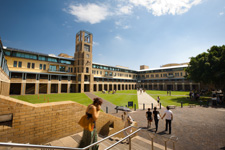|
||||||||||||||||||||||||||||||||||||||||||||||||
| Advanced European Philosophy - ARTS3365 | ||||||||||||||||||||||||||||||||||||||||||||||||

Description
Subject Area: Philosophy Module: "Existential Phenomenology & its Critics"(Semester 1, 2011) The course explores ideas of human existence that have emerged from 20th Century existential phenomenology. The focus will be on the key works of either Maurice Merleau-Ponty or Martin Heidegger. We will examine how existential phenomenology challenges the way we usually understand the relation between being and thinking, the role of the body in agency and perception, meaning and sense, temporality and spatiality, intersubjectivity and self-other relations, community, and freedom. Background to these themes is provided by studying aspects of Husserl phenomenology and Sartre and Beauvoir's existentialism. Recent advances in the field are examined through the philosophies of sympathetic critics such as Emmanuel Levinas, who develops a new approach to ethics through a critique of phenomenology, and Jean-Luc Nancy, whose ideas of community and politics emerge from critical engagement with existential phenomenological themes. Module: "Hegel and German Idealism" Introduces Hegel's thought through a close examination of key Hegelian texts such as 'The Phenomenology of Spirit' and 'The Philosophy of Right'. Some attention will be given to Hegel's influence on European philosophy, his relation to his German idealist contemporaries (Schelling and Fichte), as well as Hegel’s influence on contemporary philosophy. Issues examined may include: modernity, knowledge, spirit, dialectic, experience, self-consciousness, normativity, civil society, reconciliation and freedom." |
||||||||||||||||||||||||||||||||||||||||||||||||


